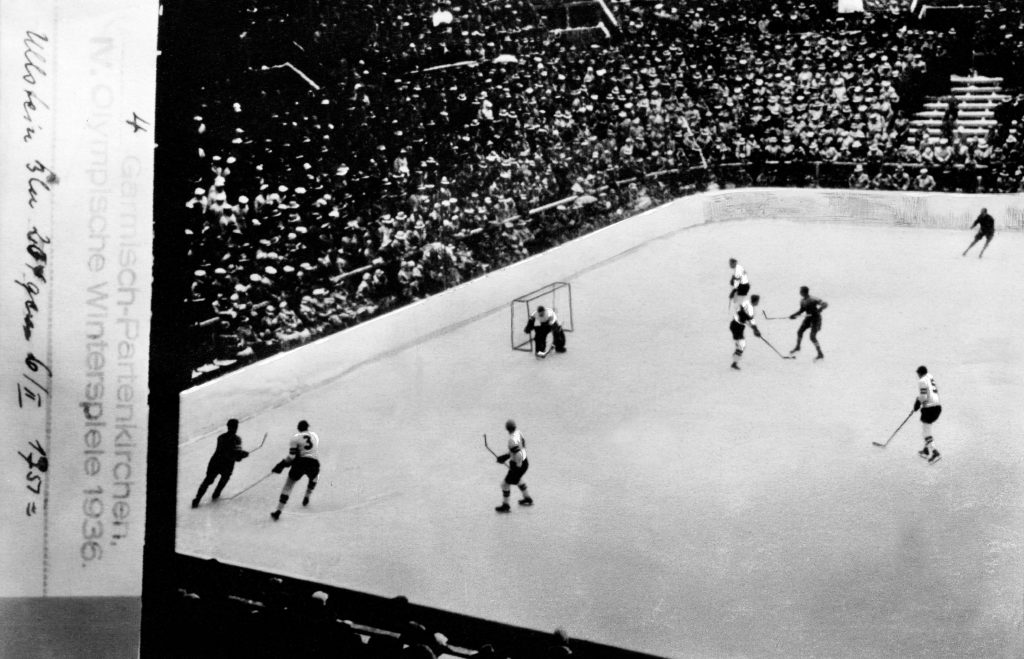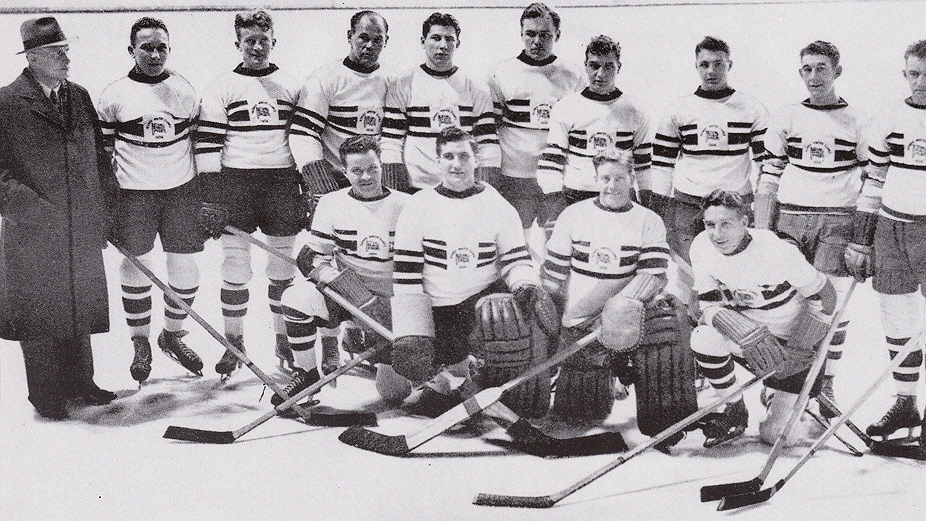This is the greatest Olympic hockey story never told — at least, until now.
The tale begins in the tiny Upstate New York village of Clinton — next door to Utica — and ends at an outdoor rink in Nazi Germany, circa 1936.
In case you never heard of Clinton, it deserves the title of, “World’s Biggest Little Hockey Town.”
Among other starry ice events, it just completed a celebration of 100 Years of Hockey in this village of 2,000 puck nuts, but that’s not the big puck tale I’m about to tell you.
It happens to be all about a pair of Clinton hockey people who bewitched, bothered and bewildered the vicious dictator, Adolf Hitler, at the start of the 1936 Winter Games in Germany.
The Hitler terror had been taking place for three years and inspired talk among many nations — America included — about boycotting the Winter Games. Only one country refused to attend and that was the Soviet Union.
Other than the United States and Germany, participants included Canada, Czechoslovakia, Italy, England, France, Japan, Sweden, Switzerland, Austria, Poland, Hungary, Finland, Yugoslavia, Latvia, and Belgium.
The Winter Olympics were held in the Alpine town of Garmisch-Partenkirchen where an outdoor hockey “arena” was actually constructed on a frozen lake.

Uncle Sam’s entry was led by Albert Prettyman — coach of Clinton’s Hamilton College — and renowned in hockey circles as “the father of college hockey.”
Among Prettyman’s credits — he created Clinton’s first hockey rink a century ago and also established the NCAA hockey rules committee, of which he was chairman for 18 years. He, therefore, qualified to organize Uncle Sam’s 1936 puck entry.
Prior to the team’s sailing for Germany on the good ship “President Roosevelt,” on January 23, 1936, Prettyman’s regular goalie took sick and Albert chose Hamilton’s starting puck-stopper, Francis Baker, to make the trip just in case.
As it happened, it was a fortuitous move since Baker was the only one on the team who spoke fluent German. It would further help that Fran feared no one — and that would include the universally feared Hitler.
When Prettyman’s team arrived for the Games, Nazi Germany had become a police state where, for three years, persecution of minorities was widespread, concentration camps were opening and fear was the feeling of the day.
Yet, an arresting hockey note involved the German sextet diverting attention from the horrors. Hitler had already been persecuting the German Jews for three years, but made the exception for one Jewish hockey player, Rudi Ball.
Rudi happened to be acknowledged as the best, most-popular and dreaded — by foes — player in European hockey.
Ball had scored over 500 goals during his career and his two brothers, Gerhard and Heinz, represented Germany in many international competitions before Hitler came to power. That included the 1932 German Olympic Ice Hockey team, which won a Bronze Medal thanks to Rudi’s three goals.
Win-crazy Nazi leaders realized that without Ball in the lineup, Deutschland would not have a chance for a medal.
As a result, Ball was invited to play for Germany and was even named the team captain. But, the Jewish player insisted that, once the Winter Games were finished, he and his family be allowed to emigrate from the Nazi dictatorship.
[Editor’s note: Ball’s family did, in fact, leave Germany and settled in South Africa where Rudi continued his hockey career. In 2004, Ball was inducted into the International Hockey Hall of Fame.]
As for Prettyman and Baker, they would soon demonstrate that they were neither fazed by nor in fear of Hitler. When the hockey team was supposed to salute the Fuhrer during the pre-game ceremonies, instead, they snubbed him.
Angry over the insulting snub, Hitler later invaded Team USA’s dressing room and confronted Prettyman, denouncing (in German) the Americans behavior.
Furthermore, the Führer boasted that in the upcoming game with the Americans, his German sextet would be the victor.
At that point, German-speaking goalie Baker stepped into the fray, blocked the Nazi leader’s verbal shot and fired right back, “We will beat Germany tomorrow.”
Not satisfied with his counterattack, the goalie then added in his best college German, “DIE VEREINIGTEN STAATEN WERDEN DEUTSCHLAND IMMER BESIEGEN.”
Translated: “The United States always will beat Germany.”
Just as Baker had predicted, the Americans won, 1-0, during a snowstorm on the outdoor rink. “It snowed so hard, they kept having to stop the game to clear the ice,” Baker recalled.

Team USA finished the tourney with a 5-2-1 record. The skaters tied Great Britain, the eventual Gold Medal winner, 0-0, over three overtimes.
The Americans went on to win a Bronze Medal, while the host Germans had a chance as long as Ball could play. Rudi skated in the first four matches, scoring two goals, but was injured and missed the final five, leaving Germany in fifth place, without a medal.
Interestingly, Baker, after graduating from Hamilton College, became a doctor and joined the Army in World War II as a medical corpsman. He landed in Normandy on D-Day plus-two. Baker later followed the GIs to victory over Hitler’s Germany in 1945.
Once again, the goaltender from Clinton made good on his boast, “The United States will always defeat Germany.”
As for the actual 1936 Olympic hockey, historians point out that the Americans might have even won at least a Silver Medal had eligibility requirements been more stringent.
Many of the Gold Medal-winning Brits actually were Canadian “ringers” who had dual citizenship. No such benefit was enjoyed by the Amerks.
Now, 82 years after those controversial games, stories about Baker’s put-down of Hitler, his regime and team still are told on the streets of Clinton.
In fact, during the village’s three-day celebration — February 8-11, 2018 — Prettyman also was celebrated as the founder of the rich hockey tradition at Hamilton College.
And, finally, the greatest Olympic hockey story never told about Albert and Fran winning their face-off against Adolf Hitler is told beyond the boundaries of Clinton and the Hamilton College campus.
Or, as Baker so aptly noted, “Die vereinigten staaten werden Deutschland immer besiegen!”
